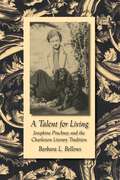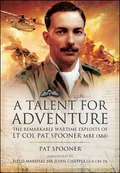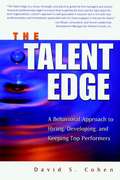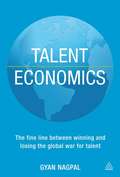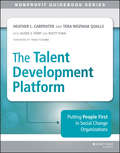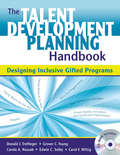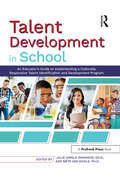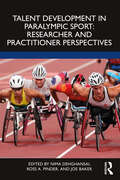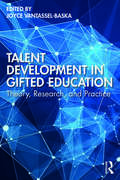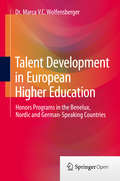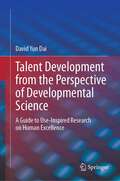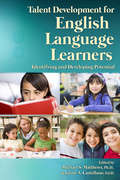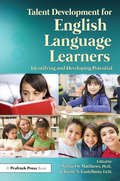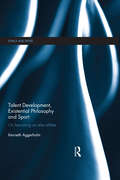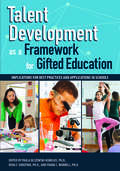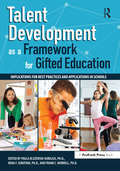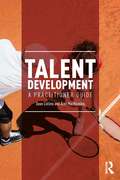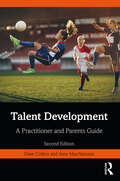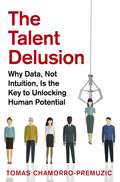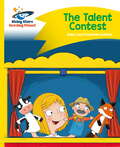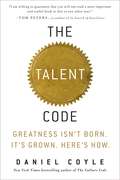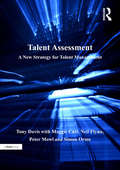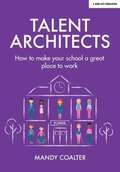- Table View
- List View
A Talent for Living: Josephine Pinckney and the Charleston Literary Tradition (Southern Literary Studies)
by Barbara L. BellowsJosephine Pinckney (1895--1957) was an award-winning, best-selling author whose work critics frequently compared to that of Jane Austen, Edith Wharton, and Isak Dinesen. Her flair for storytelling and trenchant social commentary found expression in poetry, five novels -- Three O'Clock Dinner was the most successful -- stories, essays, and reviews. Pinckney belonged to a distinguished South Carolina family and often used Charleston as her setting, writing in the tradition of Ellen Glasgow by blending social realism with irony, tragedy, and humor in chronicling the foibles of the South's declining upper class. Barbara L. Bellows has produced the first biography of this very private woman and emotionally complex writer, whose life story is also the history of a place and time -- Charleston in the first half of the twentieth century.In A Talent for Living, Pinckney's life unfolds like a novel as she struggles to escape aristocratic codes and the ensnaring bonds of southern ladyhood and to embrace modern freedoms. In 1920, with DuBose Heyward and Hervey Allen, she founded the Poetry Society of South Carolina, which helped spark the southern literary renaissance. Her home became a center of intellectual activity with visitors such as the poet Amy Lowell, the charismatic presidential candidate Wendell Willkie, and the founding editor of theSaturday Review of Literature Henry Seidel Canby. Sophisticated and cosmopolitan, she absorbed popular contemporary influences, particularly that of Freudian psychology, even as she retained an almost Gothic imagination shaped in her youth by the haunting, tragic beauty of the Low Country and its mystical Gullah culture.A skilled stylist, Pinckney excelled in creating memorable characters, but she never scripted an individual as engaging or intriguing as herself. Bellows offers a fascinating, exhaustively researched portrait of this onetime cultural icon and her well-concealed personal life.
A Talent for Adventure: The Remarkable Wartime Exploits of Lt Col Pat Spooner MBE.
by Pat SpoonerBooks on prison camps, daring escapes and life with the Resistance abound. Pat Spooners story is different and more compelling in one important respect. It recounts the gripping and dramatic rescue of two senior British generals (one a VC) and an air vice marshal from occupied Italy by the author and his companion who had themselves both escaped from an Italian PoW camp.This book covers a range of wartime exploits from operating behind Japanese lines in Burma and Malaya to laying secret dumps on remote islands in the Bay of Bengal for the benefit of RAF aircrew unable to reach their base. At the wars end, Pat Spooner, a 25-year-old lieutenant colonel, commanded a war crimes investigation unit in Java and Burma. He describes his personal experiences of the intensive efforts to track down and bring to justice the perpetrators of some of the foulest crimes ever committed by Man. Then, as a senior staff officer (Assistant Adjutant General) he spent a further twelve months controlling the nerve center, in Singapore, of the entire war crimes organization in Southeast Asia involving 18 investigation units.
The Talent Edge: A Behavioral Approach to Hiring, Developing, and Keeping Top Performers
by David S. CohenA practical step-by-step approach to hiring the right person. Every hiring manager knows that the traditional hiring and interviewing process is a poor tool for predicting organizational fit and future on-the-job success. Behavioral interviewing can improve your chances of picking the right candidate two to five times over traditional processes. It focuses on how the candidate works rather than on skills, qualifications, and impressions. The Talent Edge shows how you can develop a concrete understanding of what your own top performers do differently than the majority of their peers, and how to translate that knowledge into a better hiring system. While using case studies from organizations that have successfully transformed their hiring practices, the book articulates the business case for a Behavioral Interviewing system, and provides a roadmap for implementing it. Comprehensive coverage includes: how to write job profiles and translate them into questions and answers that can be used in the interview; how to prepare for the interview, ask questions, and probe for the right information. The book also offers advice on how behaviors that are defined and proven to be useful in the hiring process can be incorporated into performance management, career development, and succession planning.
Talent Economics
by Gyan NagpalThis book looks at the circumstances surrounding talent today. It also asks business leaders to step back and understand the global talent landscape, before translating this understanding into strategy. It is in this area that economic inquiry as a disciple can be invaluable to human resource management, as simply put - economics is the study of how the forces of supply and demand allocate scarce resources. Talent Economics is an interdisciplinary viewpoint, which seeks to bring workforce analysis, management practice and strategy together. The specific aim is to spark greater inquiry and understanding of - 1. The Macro talent realities of supply and demand within a country's labour force. 2. The Micro talent trends which help us understand how the 21st century employment relationship is changing.
The Talent Development Platform: Putting People First in Social Change Organizations
by Heather Carpenter Tera QuallsPutting People First in Social Change Organizations The Talent Development Platform is about results driven talent development for social change. <P><P>Written by seasoned nonprofit experts, this book provides a holistic process for creating an in-house training and talent development program. The Talent Development Platform offers organizations the tools for ensuring their professional development systems are successful through regular feedback loops, tailored for learning styles, and specific to their organization. Detailed case studies provide insight into the strategies used by organizations that have implemented the Talent Development Platform, and interviews with experts in the field give readers a handle on the most current thinking. Robust resource guides facilitate the talent development process, and online access to the Talent Development Platform and assessments help streamline the workflow. Social change organizations make the most of limited resources, but often overlook developing the talent they already have. This book gives readers a plan for finding and nurturing their internal talent to reduce turnover and improve organizational efficiency. More specifically the book helps organizations: Develop organizational, department, and position specific competencies. Create and revise job descriptions. Assess staff and volunteer proficiency levels with created competencies. Determine staff and volunteer learning styles. Establish professional development goals and objectives tied to strategic goals. Implement professional development with on the job learning, mentoring, and training. Calculate a return on talent investment. Evaluate talent development implementation and proficiency level changes. Implementing the Talent Development Platform provides organizations with tangible benefits in the form of lower turnover and greater output (without the burnout) from employees and volunteers, as well as intangible benefits that make organizations more attractive to top talent.
The Talent Development Planning Handbook: Designing Inclusive Gifted Programs
by Donald J. Treffinger Grover C. Young Carole A. Nassab Edwin C. Selby Carol V. Wittig"Makes a distinct contribution to program planning for gifted education. Provides great charts that illustrate the key basics for identifying change." —Tara McGuigan, Resource Teacher San Diego Unified School District, CA "The major strength of the book is its step-by-step process. There are plenty of charts and checklists that make the book user-friendly. Great planning guide." —Cheryl Brockman, Gifted Education Teacher Jonathan Alder Local School District, Plain City, OH Gain tools to custom-build programs that nurture students' strengths and talents! Gifted programs should be as innovative, unique, and ever-evolving as the exceptional students they serve. This comprehensive handbook provides the expert guidance and tools necessary for shaping a contemporary, inclusive talent development program tailored to students' individual needs and strengths. Rather than imposing a "one-size-fits-all" model, this guide offers a flexible six-stage framework for planning, implementing, evaluating, and enhancing gifted programs. The authors draw on current theory, research, and more than 20 years of professional experience with schools, districts, and state education agencies to provide proven approaches for designing new programs and reinvigorating existing ones. Practical tips and ready-to-use resources include: A CD-ROM with reproducibles, presentations, and templates aligned with each chapter Needs assessment and climate inventory exercises and resources Methods for constructing and implementing action plans Strategies for tackling logistics, including how to form planning committees and effectively lead the planning process Program goal-setting and evaluation tools Ideal for gifted education coordinators, administrators, and special education directors, The Talent Development Planning Handbook covers best practices from leading experts to inspire innovation, improvement, growth, and change for talent development that contributes to the total school program.
The Talent Development Planning Handbook: Designing Inclusive Gifted Programs
by Donald J. Treffinger Grover C. Young Carole A. Nassab Edwin C. Selby Carol V. Wittig"Makes a distinct contribution to program planning for gifted education. Provides great charts that illustrate the key basics for identifying change." —Tara McGuigan, Resource Teacher San Diego Unified School District, CA "The major strength of the book is its step-by-step process. There are plenty of charts and checklists that make the book user-friendly. Great planning guide." —Cheryl Brockman, Gifted Education Teacher Jonathan Alder Local School District, Plain City, OH Gain tools to custom-build programs that nurture students' strengths and talents! Gifted programs should be as innovative, unique, and ever-evolving as the exceptional students they serve. This comprehensive handbook provides the expert guidance and tools necessary for shaping a contemporary, inclusive talent development program tailored to students' individual needs and strengths. Rather than imposing a "one-size-fits-all" model, this guide offers a flexible six-stage framework for planning, implementing, evaluating, and enhancing gifted programs. The authors draw on current theory, research, and more than 20 years of professional experience with schools, districts, and state education agencies to provide proven approaches for designing new programs and reinvigorating existing ones. Practical tips and ready-to-use resources include: A CD-ROM with reproducibles, presentations, and templates aligned with each chapter Needs assessment and climate inventory exercises and resources Methods for constructing and implementing action plans Strategies for tackling logistics, including how to form planning committees and effectively lead the planning process Program goal-setting and evaluation tools Ideal for gifted education coordinators, administrators, and special education directors, The Talent Development Planning Handbook covers best practices from leading experts to inspire innovation, improvement, growth, and change for talent development that contributes to the total school program.
Talent Development in School: An Educator's Guide to Implementing a Culturally Responsive Talent Identification and Development Program
by Julie Dingle Swanson Meta Van SickleTalent Development in School helps educators utilize research-based curriculum and strategies to implement talent development in the classroom. This practical guide:Focuses on a talent development model that is centered on teacher learning.Highlights talent development's impact on culturally, linguistically, and economically diverse learners.Details how to apply the talent development model in one's school or district and opening access and opportunity to all students.Reviews current theories, concepts, and research on talent development in the field of gifted education.Is perfect for teachers, coordinators, and administrators.Talent Development in School features techniques for culturally responsive teaching and considerations for how psychosocial skills and noncognitive influences on learning—such as motivation, grit, resiliency, and growth mindset—affect talent development. Written by experts in the field, this book will become a go-to for professional learning and development.
Talent Development in Paralympic Sport
by Nima DehghansaiIdentifying and developing talented athletes to their fullest potential is a central concern of sports scientists, sports coaches, and sports policymakers. However, there is very little practical and theoretical knowledge for those working in Paralympic sport. The book collates the state of the science of current knowledge and practice in talent identification and development in this context by capturing international perspectives of current systems and processes. Written by a team of leading international experts, Talent Development in Paralympic Sport: Researcher and Practitioner Perspectives explores key factors and issues in contemporary sport, including: • current state of pathways in Paralympic sports across the globe • designing optimal developmental environments • long-term modeling of Paralympic athlete development • understanding the complexity of talent selection in Paralympic sport With an emphasis on practical implications for all those working in sport, the book offers an authoritative evaluation of the strengths and weaknesses of contemporary systems for identifying and developing talent in Paralympic sport. This is important reading for any student, researcher, practitioner, or coach with an interest in skill acquisition, youth Para sport, elite Paralympic sport, Paralympic sports coaching, Paralympic sports development, sport psychology, skill development, or sports engineering. In addition, there has been interest from universities to offer courses/modules specific to Paralympic sports.
Talent Development in Gifted Education: Theory, Research, and Practice
by Joyce VanTassel-BaskaThis volume brings together experts in gifted education to explore critical perspectives in talent development across the lifespan, guiding readers toward a deeper understanding of advanced learners and their education. Chapters in the first section delve into the foundational theory, research, and models of practice underpinning gifted education and talent development, while the second section examines the practical applications of talent development in assessment, programming, and ongoing research. The book concludes with an exploration of talent throughout the lifespan, featuring detailed case vignettes to illustrate development across diverse fields of practice. Ideal for researchers as well as students of gifted education and creativity studies, this comprehensive handbook challenges readers to interrogate what they think they know about giftedness and talent development.
Talent Development in European Higher Education
by Dr Marca V. C. WolfensbergerThis book examines the much-debated question of how to unleash the potential of young people with promising intellectual abilities and motivation. It looks at the increasingly important topic of excellence in education, and the shift in focus towards the provision of programs to support talented students in higher education. It provides a systematic overview of programs for talented students at northern European higher education institutions (HEIs). Starting in the Netherlands, where nearly all HEIs have developed honors programs over the past two decades, the book explores three clusters of countries: the Benelux, the Nordic and the German-speaking countries. For each of these countries, it discusses the local culture towards excellence, the structure of the education system, and the presence of honors programs. In total, the book reviews the special talent provisions for nearly four million students at 303 higher education institutions in eleven countries. In addition, it offers an analysis of the reasons to develop such programs, a look into the future of honors education and a practical list of suggestions for further research. The Sirius Program assigned Marca Wolfensberger to carry out this research.
Talent Development from the Perspective of Developmental Science: A Guide to Use-Inspired Research on Human Excellence
by David Yun DaiThis is a guide book for the field of studies on talent development and human excellence. It reviews the existing literature on the topic and helps map out a taxonomy of research with detailed description of purposes and methods of specific kinds of research on the topic and how each of them contributes to the larger scheme of understanding, identifying, and promoting talent development and human excellence for the vitality of society as well as the fulfillment of individuals. It fits with the new trend of developmental science that promotes use-inspired research and seeks a deep understanding of developmental diversity and aims to promote positive development, including human excellence. It is intended to guide researchers and graduate students in this emerging field of studies from a broad developmental science perspective.
Talent Development for English Language Learners
by Michael Matthews Jaime CastellanoTalent Development for English Language Learners offers concrete guidance to teachers, schools, and administrators seeking to maximize the potential of all of their students. Each chapter will focus thematically on an issue relevant to developing the talents and potential of gifted English language learners (ELLs) in inclusive educational settings. Examples are provided of how schools or educators might conventionally conceptualize and handle the issues related to ELLs and what the concerns or unintended negative outcomes are for gifted ELLs. The authors focus on what an "ideal" response might be from the lens of both the gifted education and the language education field, and how collaborative efforts across these perspectives yield effective interventions in schools and related educational settings for students who are both English language learners and highly academically able.
Talent Development for English Language Learners: Identifying and Developing Potential
by Michael S. Matthews Jaime A. CastellanoTalent Development for English Language Learners offers concrete guidance to teachers, schools, and administrators seeking to maximize the potential of all of their students. Each chapter will focus thematically on an issue relevant to developing the talents and potential of gifted English language learners (ELLs) in inclusive educational settings. Examples of how schools or educators might conventionally conceptualize and handle the issues related to ELLs and what the concerns or unintended negative outcomes are for gifted ELLs are provided. The authors focus on what an “ideal” response might be from the lens of both the gifted education and the language education field, and how collaborative efforts across these perspectives yield effective interventions in schools and related educational settings for students who are both English language learners and highly academically able.
Talent Development, Existential Philosophy and Sport: On Becoming an Elite Athlete (Ethics and Sport)
by Kenneth Aggerholm'Why don’t young athletes in sport just quit?’ Starting with this question and drawing on existential philosophy, phenomenology and hermeneutics, Talent Development, Existential Philosophy and Sport seeks a deeper understanding of the experience of being a talented young sportsperson striving to become an elite athlete. As an alternative to conventional approaches to talent development governed by a worldview of instrumental rationality, the book introduces key ideas from educational philosophy to describe talent development through the concept of elite-Bildung. It pursues an existential understanding of developing in sport as a process of freedom, self-transcendence, striving for excellence and building up habits. The book highlights a range of ambiguous and intriguing existential phenomena – most prominently wonder, question, expression, humour and repetition – and reveals an existential layer of meaning within talent development in sport, which can facilitate the process of becoming an elite athlete and give young athletes a number of reasons not to quit. By deepening our understanding of performance and development in sport, and the process of becoming an elite player, this book is important reading for any serious student or researcher working in the philosophy of sport, sports coaching, sports development, sport psychology or applied sport science.
Talent Development as a Framework for Gifted Education: Implications for Best Practices and Applications in Schools (Other Ser.)
by Paula Olszewski-Kubilius Rena Subotnik Frank Worrell"Talent development" is a phrase often used in reference to the education of gifted children. Recently, it has been presented by researchers to refer to a specific approach to the delivery of gifted education services. Much of this discussion has been at the conceptual level, and there is a need for translation of the model into concrete practices and examples that enable educators to better serve gifted children within their schools and districts. This book addresses that need. The research behind the talent development framework is briefly reviewed, followed by practical implications for identification and program design within domains of talent. To illustrate successful approaches, the authors draw on examples from academic domains, as well as performance fields such as sports and music, to help teachers, school administrators, school psychologists, social workers and counselors, graduate students, and parents develop gifted students' talents.
Talent Development as a Framework for Gifted Education: Implications for Best Practices and Applications in Schools
by Paula Olszewski-Kubillus Rena F. Subotnik Frank C. Worrell"Talent development” is a phrase often used in reference to the education of gifted children. Recently, it has been presented by researchers to refer to a specific approach to the delivery of gifted education services.
Talent Development: A Practitioner Guide
by Dave Collins Aine MacNamaraThe process of talent development (TD) is essential to success in any sport. Drawing on the latest evidence and a considerable experience base, this book dispels myths about talent development and offers practical advice on the TD pathway from pre-school to elite level. Aimed at practitioners and other stakeholders involved in the TD process – including coaches, scientists, administrators, educators, students, parents, policy makers and senior development athletes – this is the only up-to-date practical guide to TD in sport. Written by experts with more than 20 years’ experience in TD training, coaching and research, it covers key topics from deliberate practice and fundamental movement skills to designing and managing a TD pathway. It also includes contributions from professionals working in a wide range of sports, providing real-world insights into important topics including: the recruitment process academy and apprenticeship preparation the coach–athlete relationship what to do to stay ahead considerations for parents and coaches. Talent Development: A Practitioner Guide is an indispensable resource for all those interested in talent identification, talent development and coaching practice in elite sport.
Talent Development: A Practitioner and Parents Guide
by Dave Collins Aine MacNamaraThe process of talent development (TD) is essential to success in any sport. Drawing on the latest evidence and a considerable experience base, the second edition of this book dispels myths about talent development and offers practical advice on the TD pathway from pre-school to elite level. Aimed at practitioners and other stakeholders involved in the TD process – including coaches, scientists, administrators, educators, students, parents, policymakers and senior development athletes – this is an up-to-date practical guide to TD in sport. Written by experts with more than 20 years of experience in TD training, coaching and research, it covers key topics from deliberate practice and fundamental movement skills to designing and managing a TD pathway. It also includes contributions from professionals working in a wide range of sports, providing real-world insights into important topics including: the recruitment process, academy and apprenticeship preparation, the coach-athlete relationship, what to do to stay ahead, and considerations for parents and coaches. Talent Development: A Practitioner and Parents Guide is an indispensable resource for all those interested in talent identification, talent development and coaching practice in elite sport.
The Talent Delusion: Why Data, Not Intuition, Is the Key to Unlocking Human Potential
by Tomas Chamorro-Premuzic'This book shows how to find, attract, develop, motivate, and retain stars. It's full of evidence and provocative ideas to help every talent leader' Dr Adam Grant, Wharton Professor, New York Times bestselling author, Originals and Give and Take'This is the book I want to hand every manager I've ever worked with . . . Every chapter is filled with quotes, findings, and ideas that I want to post on Twitter and share with the world' Dr. Todd Carlisle, VP of HR, Twitter WHY THE SCIENCE OF PEOPLE IS YOUR KEY WEAPON IN THE WAR FOR TALENTAll organisations have problems, and they nearly always concern people: how to manage them; whom to hire, fire or promote; and how to motivate, develop and retain high potential employees. Psychology, the main science for understanding people, should be a pivotal tool for solving these problems - yet most companies play it by ear, and billions of dollars are wasted on futile interventions to attract and retain the right people for key roles.Bridging the gap between the psychological science of talent and common real-world talent practices, The Talent Delusion aims to educate HR practitioners and leaders on how to measure, predict and manage talent. It will provide readers with data-driven solution to the common problems around employee selection, development and engagement; how to define and evaluate talent; how to detect and inhibit toxic employee behaviours; and how to identify and harness leadership potential.
The Talent Delusion: Why Data, Not Intuition, Is the Key to Unlocking Human Potential
by Tomas Chamorro-PremuzicAll organisations have problems, and they nearly always concern people: how to manage them; whom to hire, fire or promote; and how to motivate, develop and retain high performers. Psychology, the main science for understanding people, should be a pivotal tool for solving these problems - yet most companies play it by ear, and billions of dollars are wasted on futile interventions to attract and retain the right people for key roles. Bridging the gap between the psychological science of talent and common real-world talent practices, The Talent Delusion aims to educate HR and talent practitioners and leaders on critical talent issues. It will help readers understand the current problems pertaining employee selection, development and engagement; how to define and evaluate talent; how to detect and inhibit toxic employee behaviours; and how to motivate employees to perform to their best.
The Talent Code: Greatness Isn't Born. It's Grown. Here's How.
by Daniel Coyle'Talent. You've either got it or you haven't. ' Not true, actually. In The Talent Code, award-winning journalist Daniel Coyle draws on cutting-edge research to reveal that, far from being some abstract mystical power fixed at birth, ability really can be created and nurtured. In the process, he considers talent at work in venues as diverse as a music school in Dallas and a tennis academy near Moscow, to demostrate how the wiring of our brains can be transformed by the way we approach particular tasks. He explains what is really going on when apparently unremarkable people suddenly make a major leap forward. He reveals why some teaching methods are so much more effective than others. Above all, he shows how all of us can achieve our full potential if we set about training our brains in the right way.
Talent Assessment: A New Strategy for Talent Management
by Tony Davis Maggie Cutt Neil Flynn Peter MowlTalented and ambitious people will only stay with their current employer if they are offered positive development, motivation and nurturing to ensure they are given every chance of realizing their potential. Simple financial packages, although superficially attractive, often assuage a short term need but rarely cater for the long-term requirements of a talented person. Talent Assessment demonstrates how to manage the needs of the individual employees and those of the organization in parallel; how to identify the aspirational and development needs of potential top performers and how to manage them sensibly. This involves using techniques to assess their mindsets, behaviours and skills and then providing effective training, development and performance management interventions. IT is an increasingly important support and enabler of this kind of process and the authors provide guidance on the process and content required for a talent management database. There is also a chapter exploring the critical operation role of HR in talent management. The book is filled with practical examples and mini-case studies to help you apply the various techniques. It provides positive, practical guidelines to encourage you to implement a suitable talent management programme as well as introducing more advanced aspects of the subject, particularly in terms of assessing suitable candidates for this way of managing your organization's future.
Talent Architects: How to make your school a great place to work
by Mandy CoalterMandy Coalter draws on her extensive HR experience in the schools sector and beyond to support you to build a great place to work where everyone can excel in the interests of the children. She provides practical tips and support that will help to improve staff retention, performance and engagement, while tackling topics such as addressing teacher workload, what really motivates and retains staff and the crucial role that leaders play in ensuring great people management in schools. Insightful, captivating and authentic, Mandy suggests fresh and practical new ideas and opportunities to strengthen your school and teachers, better equipping them to support their pupils.
